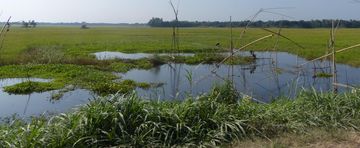
More than two million people live in northern chars* of Bangladesh who mainly depend on agriculture (crops, livestock) and seasonal labour opportunities for their livelihoods. Weak market institutions, lack of information and higher costs of operation make the chars “less attractive” destination for public and private investment. Building local market institutions and enhancing private and public services to improve the economic conditions of the char dwellers is therefore central to M4C’s approach.
M4C aims to reduce poverty and vulnerability of northern char households, by facilitating market systems for enhancing opportunities of income generation. M4C is mandated by the Swiss Agency for Development and Cooperation (SDC) and Ministry of Local Government, Rural Development and Cooperatives, Government of Bangladesh.

M4C focuses on three major intervention areas namely input supply and production services; output market and post-harvest/processing services; and financial services targeting both crops and livestock farming households. M4C supports large companies (agro-input, agro-processing, financial institutions, etc.), public agencies (research, extension, etc.) and local market actors (distributors, retailers, traders, etc.) to expand to peripheral char markets; and provide their products and services.
M4C addresses cross-cutting themes like women’s economic empowerment, disaster risk reduction, governance and conflict-sensitive programme management in project design and implementation. M4C also supports the Char Development Research Centre, a specialised center of Rural Development Academy, dedicated for improving the livelihoods of the char dwellers, to institutionalise information,
knowledge and lessons of M4C; this is to create awareness, and mobilise initiatives and investments from public and private sector, beyond the project period.

Results
M4C promoted 20 business models and supported more than 1 500 service providers e.g. agro-input companies, distributors, retailers, trailers, microfinance institutions, etc. to promote 60 services e.g. distribution and promotion of quality agro-inputs, post-harvest/processing information and services, seasonal loans for crops and livestock, etc. 25 of these services were DDR-relevant and 20 services targeted women.

